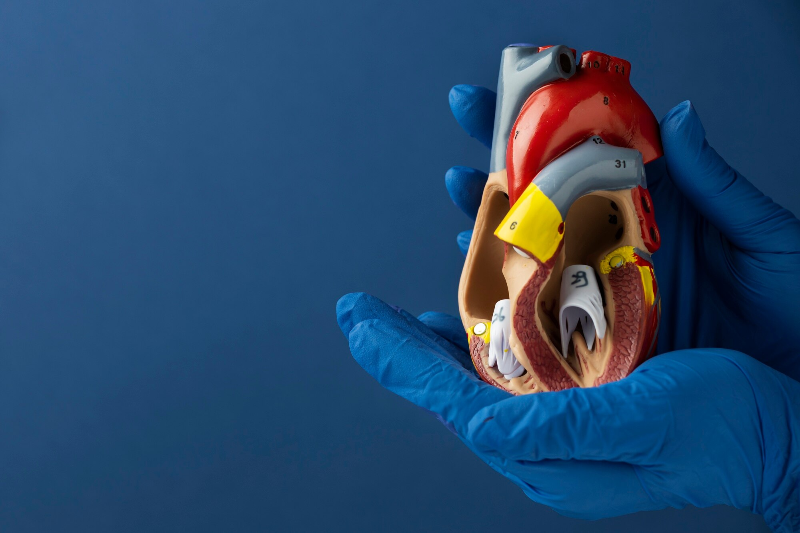Credit:www.freepik.com
Heart failure is a major global health issue characterized by high morbidity and mortality rates, posing a significant burden on patients and healthcare systems. Despite the availability of various treatment options, the pathophysiological mechanisms of heart failure are complex, and current therapeutic approaches remain suboptimal. During the progression of heart failure, there is a marked shift in myocardial cell metabolism from fatty acid oxidation to glucose metabolism. This "metabolic reprogramming" is considered an adaptive response to heart failure, but prolonged metabolic reprogramming can further impair myocardial function. Therefore, restoring normal metabolic pathways in the myocardium, particularly the ability to oxidize fatty acids, may be crucial in improving heart failure outcomes.
Receptor-interacting protein 140 (RIP140) is a transcriptional corepressor known to affect cellular metabolic status by inhibiting the expression of genes associated with mitochondrial function and fatty acid oxidation. Consequently, RIP140 has emerged as a potential therapeutic target; inhibiting RIP140 might enhance myocardial metabolic capacity, thereby improving cardiac function and preventing or mitigating the onset and progression of heart failure. However, the role of RIP140 in myocardial oxidative metabolism remains unclear.
The study by Tsunehisa et al. investigated the role of RIP140 in myocardial metabolism and cardiac function, particularly in pressure overload (PO)-induced cardiac hypertrophy and heart failure. Their findings reveal the impact of RIP140 deficiency on cardiac fuel metabolism and myocardial cell function, potentially identifying new therapeutic targets for treating heart failure.
Researchers generated cardiac and skeletal muscle-specific RIP140-deficient mice (strNrip1-/-) by crossing Nrip1-floxed mice with mice expressing Cre recombinase under the control of the muscle creatine kinase (MCK) promoter. These mice exhibited resistance to pressure overload-induced cardiac hypertrophy. Additionally, to exclude the interference of skeletal muscle gene manipulation, cardiac-specific RIP140-deficient mice (csNrip1-/-) were also generated. RNA sequencing revealed that the expression of genes associated with mitochondrial energy metabolism and contractile function was significantly increased in the hearts of strNrip1-/- mice. For example, the expression of fatty acid oxidation (FAO)-related genes (Cpt1b, Acox1, Acadm), tricarboxylic acid (TCA) cycle-related genes (Idh3g, Idh2, Ogdh), and oxidative phosphorylation (OXPHOS)-related genes (Cox4i1, Cox6a2, Cox7a1) was significantly upregulated.
In the pressure overload model, strNrip1-/- mice did not develop significant left ventricular hypertrophy (LVH) or diastolic dysfunction. Despite an increase in cardiomyocyte size, these mice exhibited significantly reduced myocardial fibrosis. Furthermore, csNrip1-/- mice showed significantly reduced left ventricular dilation and dysfunction after transverse aortic constriction combined with myocardial infarction (TAC/MI) surgery. Nuclear magnetic resonance (NMR) studies demonstrated that fatty acid metabolism was significantly enhanced in the hearts of csNrip1-/- mice. 13C-NMR studies indicated a significant increase in the contribution of palmitic acid to the TCA cycle and an enhanced triglyceride (TAG) turnover rate in these mice hearts. CUT&RUN sequencing results showed that RIP140 deficiency led to increased H3K27ac peaks in cardiomyocytes, which are enriched in genes related to lipid metabolism. Gene ontology (GO) analysis indicated that the enhanced H3K27ac peaks were abundant in regulatory loci associated with fatty acid metabolism, mitochondrial function, and myocardial contractile function. In summary, inhibiting RIP140 significantly enhances fatty acid metabolism and mitochondrial function in the heart, thereby protecting it from pressure overload-induced pathological hypertrophy and heart failure. This discovery provides a potential target for developing new treatments for heart failure. The study also suggested that the adaptive hypertrophy in response to RIP140 deficiency might be associated with the activation of the mTORC1 signaling pathway, contributing to our understanding of the molecular mechanisms underlying adaptive myocardial growth and pathological hypertrophy.
This study differs from traditional symptom management and cardiac function support by directly targeting the regulation of myocardial metabolism to fundamentally improve cardiac function. Traditional methods often focus on managing heart failure symptoms and supporting cardiac function, such as using medications to lower blood pressure or improve heart pumping efficiency. In contrast, this study aims to enhance the heart's metabolic capacity and stress resistance by inhibiting RIP140, potentially improving myocardial function from the root and slowing or reversing the progression of heart failure rather than merely managing symptoms. These innovative methods not only deepen our understanding of the pathophysiology of heart failure but also provide scientific evidence for developing new therapeutic strategies.
Despite the significant progress made in revealing the role of RIP140 in myocardial metabolic regulation, there are still some limitations and aspects that require further validation. Future studies need to increase the sample size, evaluate long-term effects, consider gender differences, explore the role of RIP140 in other metabolic tissues, and further elucidate its regulatory mechanisms. Additionally, the development and clinical translation of RIP140 inhibitors face many challenges, requiring the combined efforts of multiple disciplines to address these issues. Only through these further studies can we fully understand the role of RIP140 in cardiac metabolism and translate this knowledge into effective clinical treatment strategies.
Reference:
Yamamoto T, Maurya S K, Pruzinsky E, et al. RIP140 deficiency enhances cardiac fuel metabolism and protects mice from heart failure[J]. The Journal of Clinical Investigation, 2023, 133(9).







Post comments